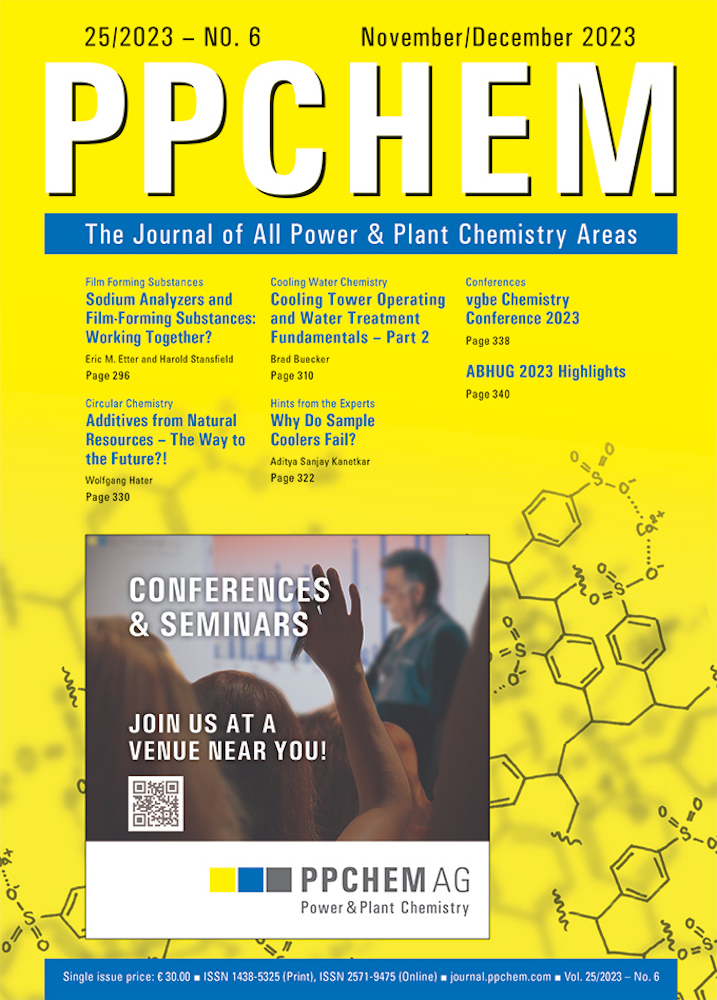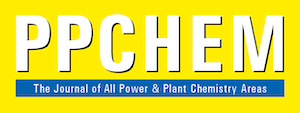
For members only
ABSTRACTS
Sodium Analyzers and Film-Forming Substances: Working Together?
Eric M. Etter and Harold Stansfield
The increasing application of film-forming substances (FFS) in power generation and process steam applications as a corrosion mitigation strategy has raised concerns regarding their impact on plant systems, particularly valves, piping, and instrumentation. This study focuses on the adverse effects reported by users of film-forming amine (FFA) products, including loss of instrumentation sensitivity, premature electrode failure, sensor fouling, and overall accuracy and reliability issues.
Experiments aimed at replicating field conditions have revealed rapid sensor fouling occurring well before standard maintenance cycles for electrode cleaning and replacement. The observed accelerated fouling necessitates frequent mechanical cleaning, posing risks of electrode damage, increased downtime, and additional labor for maintenance. Because the fouling does not result in calibration failures, this creates a situation where the analyzer appears to be functioning normally, but is no longer capable of responding to adverse events such as a condenser leak. These highly dampened responses will follow trends over time but are incapable of rapidly reflecting transient spikes or changes in values.
PPCHEM® 2023, 25(6), 296–299
For Members only
Cooling Tower Operating and Water Treatment Fundamentals – Part 2
Brad Buecker
Cooling water systems are an integral component of many power plants and industrial facilities of all types. Performance degradation from microbiological fouling, scale formation, and corrosion can seriously impact plant operation and revenue. Severe cases may force unit process or plant shutdowns. The remainder of this series examines the most problematic fouling, scaling, and corrosion mechanisms, and it outlines modern control methods for all of them. This installment focuses on microbiological fouling, with much of the discussion extracted from Reference 1.
PPCHEM® 2023, 25(6), 310–318
For Members only
Why Do Sample Coolers Fail?
Aditya Sanjay Kanetkar
In steam and water analysis systems (SWAS), the sample cooler is one of the most important components. The main function of the sample cooler is to reduce the temperature of high-temperature samples from elevated temperatures to the temperature required for analyser sensors. In the case of steam sampling, the steam samples are not just cooled, but are condensed to water (phase change).
PPCHEM® 2023, 25(6), 322–325
For Members only
Additives from Natural Resources – The Way to the Future?!
Wolfgang Hater
Additives from natural resources have been known since the end of the 19th century and have had a renaissance in recent years due to the demand to replace mineral-oil-based chemistry with materials from nature. They are considered to be green and sustainable. In spite of their positive image and a huge number of research papers, hardly any new compounds from natural materials have successfully found their way onto the market.
The assumption that natural equals harmless, green, or sustainable is quite common but does not always hold. While the criteria for green and sustainable are not well defined, the European Community has developed a standardized risk-based approach for the evaluation of whether a chemical can be safely applied.
This paper describes the major advantages and drawbacks related to natural material or biobased material. On the one hand, the production process is generally more simple and raw materials are cheap, especially if waste/recycled materials or residues are processed. On the other hand, a serious obstacle is the high variability of their chemical composition as well as the presence of components with no function.
Selected examples of studies and the application of additives from natural resources for water treatment are briefly discussed which show the potential but also the roadblocks for market success. It can be expected that they will play an increasing role in the future. Legislation will also be a strong influencing factor.
PPCHEM® 2023, 25(6), 330–337
For Members only
Review vgbe Chemistry Conference 2023 October 24 to 26, 2023 in Ingolstadt
Around 170 participants attended the 59th vgbe Chemistry Conference from October 24 to 26, 2023. The wide-ranging lecture programme was once again rounded off by an accompanying trade exhibition with 20 exhibitors who presented their products and services relating to power plant chemistry.
The vgbe conference team would like to thank all speakers, exhibitors and sponsors as well as the interested participants for their support and looks forward to the next vgbe Chemistry Conference, which will take place in Potsdam from October 22 to 24, 2024.
PPCHEM® 2023, 25(6), 338–339
ABHUG 2023 Highlights
The annual meeting of ABHUG held on the 14th–16th November 2023 in Brisbane, Australia was chaired by Barry Dooley of Structural Integrity Associates, UK and Bob Anderson, Competitive Power Resources, USA. This ABHUG conference included conventional fossil plant technology and issues closely related to those in HRSGs. ABHUG2023 attracted 100 participants from Australia, New Caledonia, New Zealand, Singapore, Switzerland, UK and USA. About 55 % of the participants were Users.
The next meeting of ABHUG will be in Brisbane around early December 2024.
PPCHEM® 2023, 25(6), 340–341

